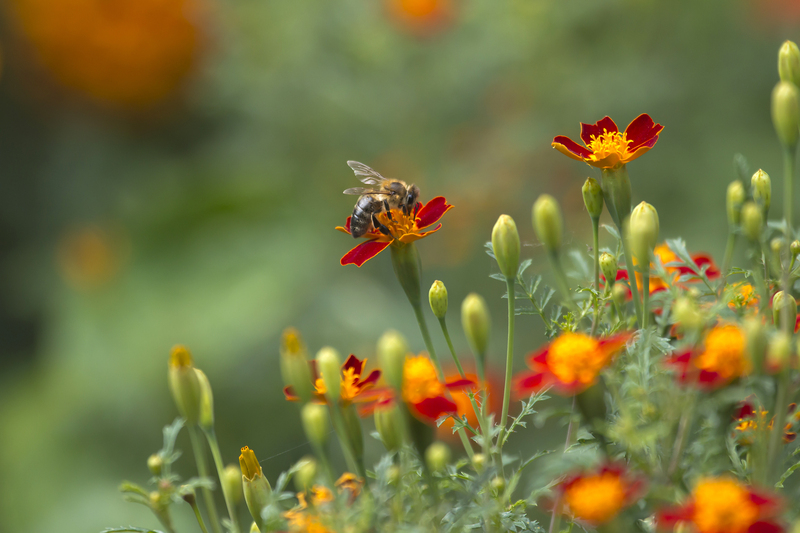Crafting a Peaceful Zen Retreat in Your Garden
Posted on 08/09/2025
Crafting a Peaceful Zen Retreat in Your Garden
If you've ever longed for a sanctuary of tranquility right outside your door, a Zen garden retreat might be the oasis you need. Transforming a part of your yard into a serene spot for relaxation and meditation isn't just an aesthetic upgrade; it's an opportunity to invite harmony, mindfulness, and natural beauty into your daily life. In this extensive guide, we will walk you through the process of creating a peaceful Zen retreat in your garden, covering ideas, essential elements, design tips, and ongoing maintenance to nurture your personal haven of calm and contemplation.
Why Create a Zen Retreat in Your Garden?
The Japanese Zen garden, or karesansui, is renowned for inspiring a sense of inner peace, reflection, and connection with nature. Integrating Zen elements into your garden provides numerous mental and physical benefits:
- Reduces stress by fostering relaxation and mindfulness
- Enhances the beauty and value of your outdoor space
- Provides a private retreat for meditation, yoga, or quiet contemplation
- Offers low-maintenance landscaping with timeless aesthetic appeal
Whether you have a sprawling yard or a compact courtyard, the principles of Zen gardening can be adapted to fit any size and style, making it accessible for every garden enthusiast.

The Principles of Zen Garden Design
Understanding the core philosophies behind Zen retreat gardens will help guide your choices and create a space that's both authentic and soothing.
1. Simplicity and Minimalism
At the heart of every Zen garden lies the principle of simplicity (kanso). This means stripping away unnecessary elements, embracing clean lines, and allowing empty space--or ma--to reflect balance and harmony.
2. Naturalness (Shizen)
A peaceful Zen retreat should never look over-designed. Favor natural materials and organic shapes, letting nature's beauty shine through. Avoid symmetry, instead opting for subtle irregularity that feels timeless and undisturbed.
3. Asymmetry (Fukinsei)
Unlike formal Western gardens, Zen gardens thrive on asynchrony. Arrange elements in odd numbers, and stagger plantings, stones, and pathways to mimic the randomness of nature.
4. Symbolism and Mindfulness
Every item in your Zen retreat garden should have purpose and meaning, encouraging mindful interaction. Elements represent aspects of the natural world--a stone for a mountain, gravel for water, a lantern as guidance.
Essential Elements of a Zen Retreat Garden
To begin crafting your peaceful garden escape, familiarize yourself with the traditional components of a Zen retreat. Incorporating these will deepen the authenticity and tranquility of your finished design.
- Raked Gravel or Sand: Serves as the "sea," symbolizing water or emptiness. Raked in flowing patterns, it becomes a focal point for meditation.
- Rocks and Stones: Represent mountains, islands, or journey markers. Choose stones of varying sizes and weathered character for a natural look.
- Bamboo Fences and Gates: Add structure and privacy, while embracing simple Japanese aesthetics.
- Water Features: While not mandatory, a small pond or trickling fountain brings soothing sound and a sense of serenity.
- Moss and Ground Covers: Soft, lush moss blankets or low ground covers like mondo grass bring softness and a sense of age.
- Minimalist Plantings: Carefully selected pines, maples, or ornamental grasses evoke the seasons without overwhelming the space.
- Lamp or Lantern: Stone lanterns light the way, symbolizing enlightenment and protection.
- Seating Area: A simple bench or platform provides a place to sit, meditate, or quietly enjoy the surroundings.
Step-by-Step Guide: Creating a Zen-Inspired Garden Retreat
Step 1: Choose the Right Location
For a truly peaceful Zen retreat, select a spot in your garden away from distractions and noise. Ideally, the area should offer both sun and dappled shade, and have a sense of enclosure using fences, hedges, or existing greenery.
Step 2: Plan Your Layout
Sketch your design, considering scale and flow. Use irregular shapes and avoid straight lines. Leave ample empty space to invite mindfulness. Allow one clear viewpoint from which the entire retreat can be appreciated, a common principle in Japanese garden design.
Step 3: Prepare the Site
- Clear weeds and debris
- Level the ground or shape gentle undulations for interest
- Lay landscape fabric to suppress future weeds
Step 4: Place Rocks and Larger Elements
Begin with your largest stones, placing them securely in the ground to mimic natural formations. These will anchor your zen escape garden and set its overall character.
Step 5: Add Gravel or Sand
- Fill areas around rocks with small, light-colored gravel or fine sand to serve as your "water."
- Rake in flowing, circular, or wave-like patterns to encourage contemplation.
Step 6: Plant with Intention
Use restraint--plants should highlight, not clutter, the design. Consider:
- Moss or liriope for soft texture
- Japanese maples for seasonal color
- Bamboo or clipped evergreens for structure and privacy
Step 7: Install Water and Lighting Features
If space and budget allow, introduce a modest water feature, like a bamboo fountain or small koi pond. Solar or low-voltage lanterns promote evening serenity and safety.
Step 8: Add Seating and Finishing Touches
Complete your tranquil Zen retreat with a simple wooden bench, a stepping stone path, or a meditation platform. Underline your intentions by adding a sculptural element, such as a Buddha statue or stone basins, but avoid overcrowding.
Plants and Materials for Zen Retreat Gardens
Choosing the right plant palette and materials is vital for your garden retreat's aesthetic harmony and ease of care. Here's a selection of classic and resilient options for a low-maintenance, dreamy Zen space:
Top Zen-Friendly Plants
- Moss: Sheet moss, fern moss, or cushion moss add woven green carpets and require little mowing.
- Bamboo: For screening, movement, and sound--but always use a clumping type or robust root barrier.
- Japanese Maple: Stunning foliage and elegant form; suitable for both ground planting and containers.
- Evergreen Shrubs: Boxwood, yew, or camellia offer structure and serenity year-round.
- Ornamental Grasses: Fountain grass or Hakonechloa give softness and echo the wind.
- Flowering Accents: Consider iris, azaleas, or cherry blossom for seasonal highlights.
Materials That Embody Zen Serenity
- Natural Stone: Weathered granite, basalt, or river rocks for authenticity.
- Bamboo: Fencing, water spouts, or screens for lightness and sound.
- Gravel/Sand: Crushed granite, pea gravel, or white sand for raked "seas."
- Wood: Simple benches, platforms, or lantern bases in unfinished cedar or teak.
Personalizing Your Zen Retreat Garden
Once you've established the basics, infuse your oasis with unique character while honoring its tranquility. Try the following:
- Add subtle color: A glazed ceramic basin, gentle blooms, or painted lantern accents can bring visual interest.
- Create a soundscape: Wind chimes or water trickling over stones enhance the calming sensory experience.
- Incorporate mindful art: Stepping stones etched with favorite meditative phrases or symbols add meaning and inspiration.
- Design for all seasons: Choose evergreens mixed with deciduous plants and moss to keep your retreat beautiful year-round.
Remember, the most profound aspect of a Zen retreat in your garden is not perfection but presence. Let your space grow and evolve with your needs.
Zen Retreat Maintenance Tips
Part of the peace derived from a Zen garden comes from the act of tending it--a meditative practice in itself. Here are some simple suggestions for keeping your Zen retreat garden pristine and harmonious:
- Regularly remove fallen leaves and debris to maintain neatness.
- Rake gravel or sand to maintain flowing patterns and replenish as needed.
- Prune moss and ground covers gently to preserve soft lines.
- Keep water features clean and in good repair to encourage wildlife and minimize mosquitoes.
Minimalism is key, so avoid letting clutter or overgrown plants detract from the calming atmosphere you've created.
Mindfulness and Meditation in Your Zen Garden Sanctuary
The true value of a peaceful garden Zen retreat goes beyond its visual beauty. It becomes a sacred site for nourishing your mental, emotional, and spiritual well-being. Here's how to maximize its benefits:
- Practice daily meditation: Dedicate a few minutes each day to sitting or walking mindfully among your garden's elements.
- Try mindful gardening: Let simple acts like pruning or raking become moving meditations, keeping your attention in the present moment.
- Host outdoor yoga or tai chi: Use your Zen garden as a backdrop for gentle movement and breathwork.
- Create rituals for peace: Light lanterns or incense at dusk to mark transitions and invite tranquility into your life.

Frequently Asked Questions About Zen Garden Retreats
Can I create a Zen retreat in a small garden or balcony?
Absolutely. Crafting a peaceful Zen garden retreat is possible even in the smallest spaces by using potted plants, mini gravel beds, and carefully chosen stones and ornaments.
Is a Zen retreat garden high maintenance?
No, most Zen-inspired spaces require less upkeep than traditional flower gardens. With minimal plantings, evergreen structure, and simple surfaces, they stay tidy with basic seasonal care.
Which colors work best for a Zen garden retreat?
Stick with nature-inspired tones--greens, greys, browns, and soft accent colors. Splash vibrant colors sparingly through select plants, ceramic basins, or textiles.
Can I add personal or spiritual elements?
Of course. The best Zen retreat gardens are deeply personal. Incorporate small statues, affirmation stones, or spiritual symbols that inspire you, taking care not to over-decorate.
Can children or pets use the Zen garden?
Yes, with sturdy pathways and non-toxic plants, a Zen retreat can be enjoyed by the whole family. Remind children to respect the contemplative mood and occasionally set aside meditation times exclusively for adults.
Conclusion: Enjoying Your Peaceful Zen Retreat Garden
A peaceful Zen retreat in your garden offers a timeless invitation to step outside the busyness of the world and rediscover the healing power of simplicity, nature, and mindful presence. By artfully selecting natural materials, placing each element with intention, and nurturing your space with care, you'll cultivate a personal sanctuary--one that enriches your home, uplifts your spirit, and stands as a beautiful living reflection of balance and tranquility.
Start your Zen retreat journey today, and enjoy years of serenity right in your own backyard.
Latest Posts
Transforming Your Yard into a Child's Wonderland
Unlock the Secrets to Cultivating a Vibrant Herb Garden
Smart Techniques for Weather-Proofing Your Garden



